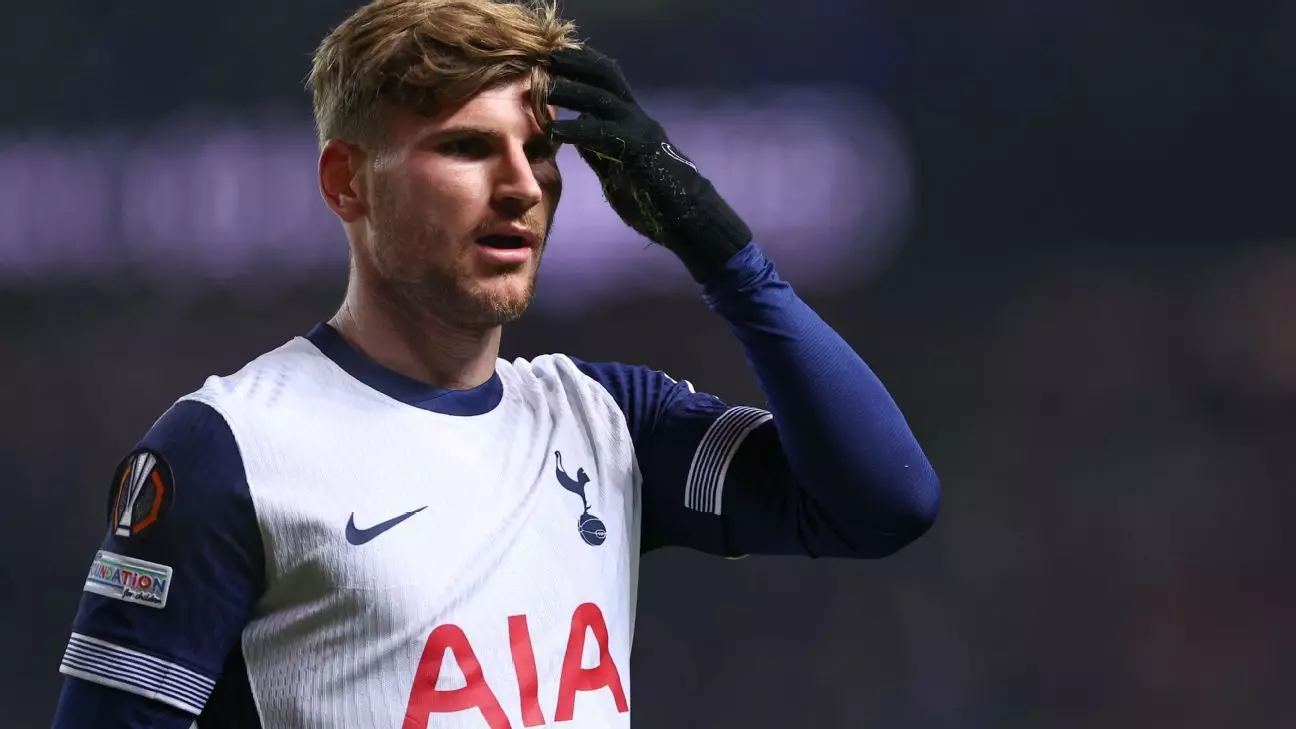Tottenham Hotspur, under the guidance of head coach Ange Postecoglou, finds itself at a crossroads following a series of performances that have not lived up to expectations. The recent Europa League draw against Rangers, which ended in a 1-1 stalemate, highlighted both the potential and the shortcomings of key players such as Timo Werner. Postecoglou’s frank assessment of Werner’s performance has stirred discussions about accountability within the squad, particularly in the context of injuries that have hindered the team’s depth.
Postecoglou’s decision to substitute Werner at halftime speaks volumes about the expectations he places on more experienced members of the team. As the coach pointed out, relying on young talents like Archie Gray and Lucas Bergvall to uplift the team’s performance showcases both a promising future and an alarming present. Postecoglou’s candid remarks underscore the tension between the need for established players to step up and the reality of a squad that is currently top-heavy with injuries and inexperienced players.
“This isn’t just criticism; it’s an expectation that senior players know how to conduct themselves,” Postecoglou emphasized. With titles and experience under his belt, Werner’s lackluster performance raises questions about not just his individual capabilities but the effectiveness of the leadership within the squad at this crucial moment. The onus is now not just on the coach to motivate, but for senior players to exhibit their worth and lead by example during a tumultuous stretch.
The coach’s urgency is palpable as he navigates through a roster thin on talent due to injuries. Tottenham has only 15 fit players, a situation that begs for collective effort. Postecoglou’s statement about not wanting to coddle players who are underperforming indicates his no-nonsense approach; he recognizes that in challenging circumstances, every player must pull weight, especially the ones deemed as key contributors.
In his assessment of Werner’s performance, Postecoglou insinuates that a distinct mentality is required from all players. “I need guys who understand the situation we’re in,” he remarked. This sets a clear precedent for expected attitudes and performances, especially within a team that lacks consistent attacking power. The expectation is not just about executing plays; it is also a psychological battle where mental toughness and resilience play a significant role.
Tottenham’s poor away record highlights another layer of challenges for Postecoglou. The team has achieved only four away victories in all competitions this ongoing season, demonstrating a pattern that could potentially derail their ambitions in both domestic and European outings. A forthcoming match against Southampton—currently languishing at the bottom of the league—presents an opportunity for redemption, yet also compounds pressure on the squad.
Postecoglou’s outlook on the team’s approach to the game illustrates his belief in an aggressive, attacking philosophy. However, implementing an attacking game plan away from home proved difficult for various reasons, including the pressure to adapt to varying conditions. “We aim to win every game, regardless of venue,” he remarked, striking a balance between ambition and reality. Yet, this commitment requires execution from all players and can quickly transform into an ego battle if not managed correctly.
While Tottenham’s current performance level raises valid concerns, this period could serve as a vital learning experience for the team as a whole. The highs and lows of football often propel a squad towards significant growth, assuming accountability is embraced. As Postecoglou hopes for an immediate response from his players, it presents a pivotal moment where attitudes can be reshaped, and desperation can fuel determination.
The road ahead looks tough, but the integration of younger talents alongside experienced internationals could potentially lead to a transformative phase for Tottenham. It requires the maturity of senior players to not just critique but also to uplift those around them, thereby strengthening team cohesion and performance. As Postecoglou continues to push for improvements, the focus remains on resilience, adaptability, and a collective commitment to success in what has become a demanding football landscape.

